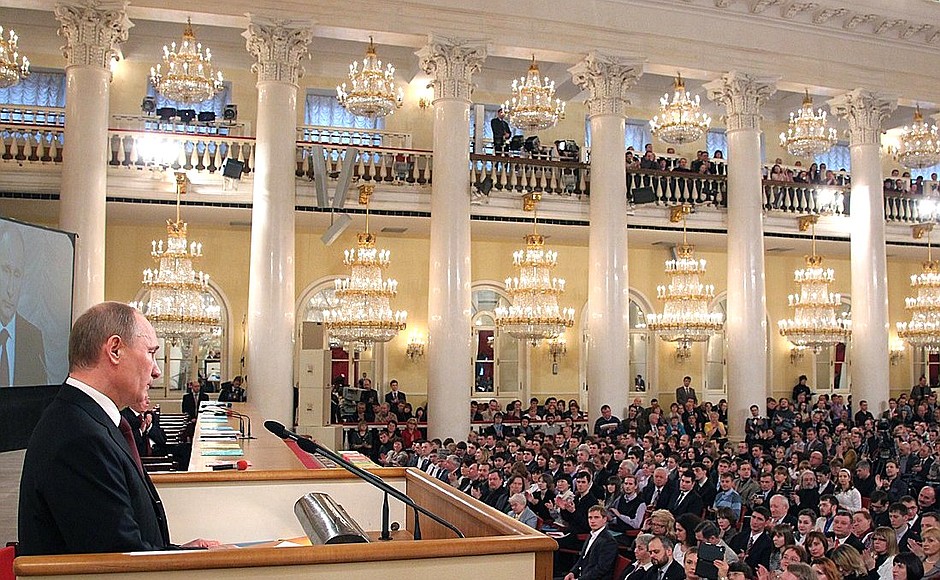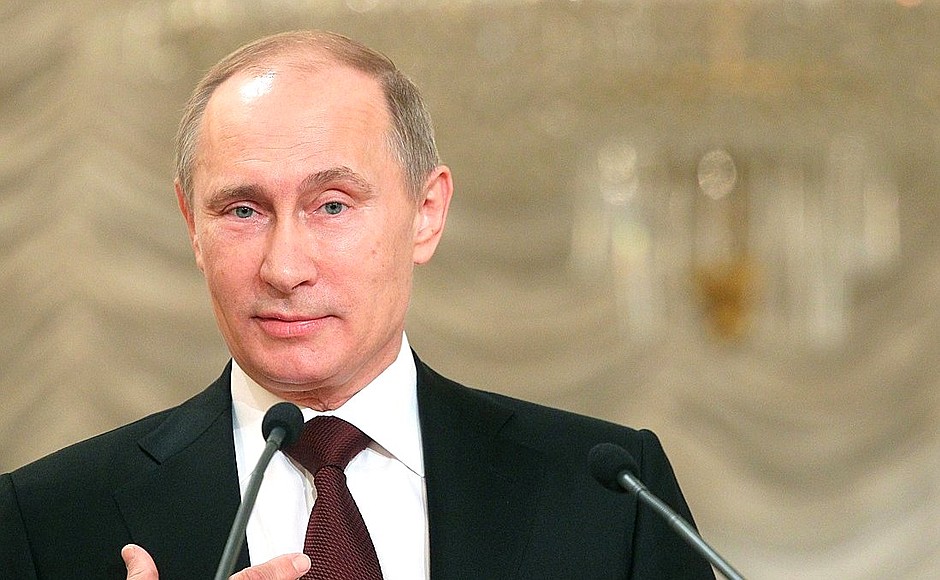The President’s participation in the Congress was not planned, but, as Vladimir Putin said addressing the forum participants, he found it necessary to clarify the national leadership’s position on these important issues.
* * *
President of Russia Vladimir Putin: Good afternoon, friends,
This is an unusual event, an unusual forum: the Russian Congress of Parents. All of us are parents, at least the majority of Russians are. I understand that today we have a meeting of the core group of parents. Your agenda includes a number of issues that have great importance to our society.
I just came in and was told that Mr Kurginyan spoke before me and his speech was very emotional. This is understandable because these issues are very acute and they concern everyone.
I thought it was my duty to meet with you and explain my own position on these issues, the position of the country’s leadership. Especially since I have received a petition, which was addressed to me personally and signed by 141,000 people. I am sure that there would have been even more signatories if everyone interested in this issue had the opportunity to sign the petition. People are truly concerned about and opposed to some mechanisms that are part of the juvenile justice system.
Such a strong public reaction was caused by the draft laws proposing direct or indirect regulation of relations between parents and children, as well as special legal mechanisms regarding work with minors.
I think everybody realises that it would be wrong to leave absolutely everything as it is. We must move forward, utilise modern techniques that are used in other countries but this should be done very carefully. I would like to say a few words about this issue.
This concerns two laws. The first was submitted by the President in March 2012, and the second by the Government on September 25, 2012. As I understand it, those are the laws in question.
I would like to make a few points in this regard.
First. Public opinion will certainly be heard and taken into account. In these matters, in adopting such laws, there is no room for secrecy or forcing unwanted legislation on society. I would go even further: this applies to all government decisions, or at least that is how it should be.
Second, I agree that a number of the draft laws’ provisions on foster care and control over orphans’ rights, may be ambiguous and contain explicit social risks. Most importantly, they do not take Russian family traditions fully into account.
Russia is a very big country with great ethnic and cultural diversity. There are some regions, for example, the Northern Caucasus (I see representatives of the Northern Caucasus here), where child homelessness and abandonment are historically unknown.
Russians and almost all the peoples of Russia have centuries-old traditions of a big family, which unites several generations. Care for the elderly and the children always had special importance. We must revive these traditions, while at the same time making every effort to avoid blindly copying other cultures’ experience. This is because the management models of social phenomena are controversial in these spheres and in those countries where the rules of juvenile justice are most widely applied.
There are some advantages and great many disadvantages. Incidentally, the general public is aware of these disadvantages as experienced by Russian families living abroad.
There are many examples where normal, loving and hard-working parents lose custody of their children. Some cases of interference in family life are just absurd and make a mockery of justice.
An ill-considered introduction of such mechanisms can lead to the violation of family sovereignty, cause distrust and discord between parents and children, and even outright corruption, when some unscrupulous officials take advantage of such situations.
Certainly, we must and will listen to your opinions. I want to assure you of that. Draft laws must be subjected to the most thorough public debate and can only be adopted – if they are adopted at all – in the event that consensus can be reached on their main provisions. Only then will a draft law’s sound provisions designed to support families and children gain strong public support.
Family law is a very sensitive area. The laws regulating the relationship between parents and children should contain only the most unambiguous and clear language, eliminating bureaucratic abuses and multiple interpretations.
The legal drafting methodology must be perfected until it is as good as it can be. In particular, there must be a strict and exhaustive list of signs of extreme distress within a family, when the authorities can and must intervene and provide targeted assistance.
Sometimes the situation calls for urgent action on the part of the state, especially when the rights and even the life of a child are at stake. I am sure you will agree with me that intervention in such cases is necessary.
Naturally, each case is different and every detail must be taken into account. It is essential not only to act resolutely but also, most importantly, with utmost sensitivity. An impersonal, formal approach must be avoided at all cost and every effort must be made to keep the family together and provide it the support it needs. Success of the efforts for prosperous, secure children’s lives should not be measured by the number of cases when parents lose custody of their children. That is not the yardstick we should use. On the contrary, the loss of custody is very problematic solution and should be used as a last resort. Sometimes it can be just a dead end. It is an intentional or unintentional destruction of the traditional Russian family, and a strong and happy family cannot be replaced by any law or government oversight agency. That much is certain.
What is far more important is to remove the causes of social ills. Of course, this requires long-term systemic efforts that are far more demanding. We must pay constant attention to families, especially those that find themselves in difficult situations; we must work with parents who refuse to bring up their children, provide timely psychological and other assistance to pregnant women who have doubts about their ability to raise the child alone.
We have a well-developed legal system and normative base, both our own and international, which we have joined. Russia is party to a number of international legal instruments. We must use this to our advantage and increase these instruments’ effectiveness.
However, I would like to touch on another very important issue: support for the institution of adoption. We must do everything we can to make sure that orphans are adopted by families in their own country, in Russia.
You are all aware of the executive order signed at the end of December 2012. The Government was issued instructions to simplify adoption, guardianship and foster care procedures for orphaned and abandoned children, and to take measures to provide tax benefits for the adoptive and foster families, increase the lump sum payments families are entitled to when they adopt a child and the benefits paid to disabled children and persons with class I disabilities from childhood.
All these measures will add up to tangible support for our citizens who decide to take in a child from an orphanage. Perhaps we will find other effective support measures with your help. Surveys show that there are more and more people like that, including people wishing to adopt including disabled children and children with special needs.
I want to stress that Russian families that adopt children should receive support not only from the state but also from the whole society. Here, we look forward to your active contribution and support. The family must be in the centre of public attention and we should see the family as our national heritage.
Since occasions like this are rare, I would like to raise another matter. It is not directly related to the family or the draft laws you have met here to discuss, but your agenda will probably expand to include other issues. It has to do with child education and work with children, and one aspect seems to me particularly important in this regard, especially since it is surrounded by the same special, increased attention from society. I am talking about a standard literature curriculum.
As you know, the new curriculum has indeed provoked considerable debate. I share the opinion that some new authors have replaced some works of literature that make up the historical heritage of our country. By the way, I think it is good that there are new authors. True, not everyone shares their political views or the subject matter of their writing. Even so, modern Russian literature is part of world literature, and I believe that we should treat it with respect. However, when the school curriculum excludes Kuprin, Leskov and Alexei Tolstoi, Pushkin’s The Bronze Horseman, Chekhov’s The Lady with a Dog or The Man in a Case, and poems by Akhmadulina, Vysotsky and Okudzhava, the question immediately arises: why has this happened and what has replaced them?
Let me express a view that may be controversial and perhaps many of you will not agree with me, but I think even serious works of literature may sometimes have obscene language or contain scenes that readers may find shocking, but should such books be part of the compulsory curriculum at school – that is the question. I agree with those who question this decision.
I believe that the authors of the new literature curriculum should pay attention to criticism, especially since many comments are reasonable, as I have said. Therefore, I expect that the relevant agencies will draw certain conclusions.
Friends,
I am sure that the people who have met here today are true patriots of our country, true patriots of Russia. This is evidenced by your strong feelings and proactive approach to the events taking place in our country. We can only support your desire to contribute to its successful development.
We are grateful for and unconditionally support your concern for the family and the increasing role of patriotic values and civic consciousness in the education of our children. You should have no doubt about it.
I am confident that this forum, which brought together like-minded people from many Russian regions, will generate new and exciting ideas that will be needed and realised. We are ready for close partnership and collaboration.
I wish you fruitful deliberations. Thank you very much for your position.

